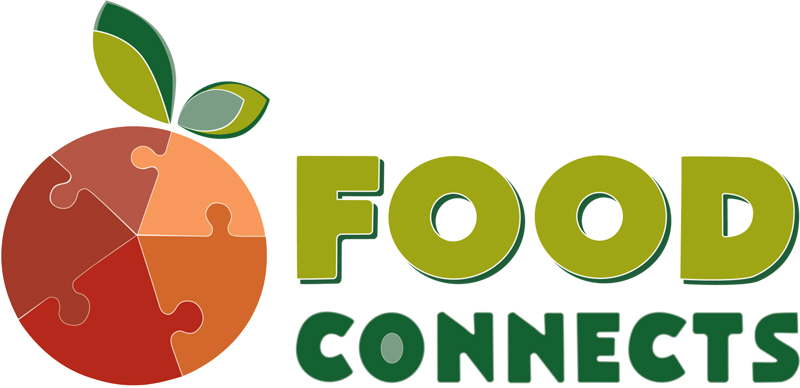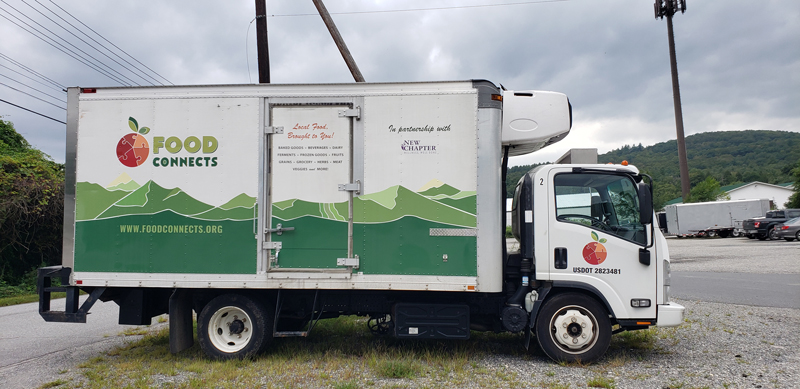Feeding The Future
Food Connects effects positive change on a local level through sustainable community food initiatives
STORY BY BENJAMIN LERNER
PHOTOGRAPHY COURTESY FOOD CONNECTS

When Hans Estrin first founded the Windham Farm and Food Network in 2008, his goal was simple: he wanted to provide the people living in Windham County with easy access to healthy food. His original vision was to create programs that would both educate local citizens about food systems and aid in the sustainable development of the local agricultural economy. A year after the founding of Windham Farm and Food, Estrin took the first steps towards actualizing his plans when he partnered with Harlow Farm in Westminster, Vermont in 2009.
Estrin received significant assistance from UVM Extension’s community agriculture initiative over the next several years, which helped him to expand his program’s reach and establish direct relationships with other local farms. Estrin was then able to facilitate a series of farm-to-institution partnerships, creating economically-viable distribution channels for fresh and local food and produce. In 2012, the Southern Vermont-based nonprofit Post Oil Solutions stepped in and provided additional support, which allowed Estrin to officially launch the program and incorporate it as an L.L.C. Richard Berkfield, Post Oil Solutions’ Executive Director at the time, began working closely with Estrin to create a strong foundation for what was to come.
Windham Farm and Food went on to partner with Food Connects in 2013, a local community nonprofit initiative that was founded by Richard Berkfield and Katherine Jandernoa. At the same time that Estrin was building relationships with local farmers through Windham Farm and Food, Jandernoa was also working to develop another local nonprofit organization, Windham County Farm to School. According to Food Connects’ Marketing and Outreach Manager Laura Carbonneau, Windham County Farm to School eventually rebranded itself as Food Connects.
Carbonneau adds that the program’s original mission was to encourage healthy eating habits in young students by allowing them to participate in hands-on agricultural activities and granting them access to fresh local produce. “The Windham County Farm to School program was brought into existence after a state grant was issued in 2007, which served as the seed money for a fledgling Farm to School program that was implemented at Brattleboro’s elementary schools,” explains Carbonneau. “After that grant was awarded, Brattleboro’s official Farm to School Committee was formed. That committee worked hard to grow the program and bring it to different schools. One of the current coaches for Food Connects’ Farm to School program, Sheila Humphreys, worked as a teacher in Brattleboro at the time. She actually helped to write the original grant proposal. It’s amazing to see those kinds of things come full circle.”
After the 2013 merger, Windham Farm and Food was combined with the Windham Farm to School Program under the Food Connects umbrella. Food Connects then continued to build relationships with additional local farmers, schools and institutions in Southeastern Vermont for the next several years while developing their Farm to School and Food Hub programs. “Our main mission is still firmly rooted in the same objectives that motivated our founding members in years past,” says Carbonneau. “We still deliver locally produced food, and we still work to implement and oversee educational services that are aimed at transforming the local food system. Our vision is to help build connected communities with healthy families and thriving farms.” Although Food Connects is primarily focused on local food distribution and education programs in Southeastern Vermont and Southwestern New Hampshire, they have also collaborated with other out-of-state food hubs, such as Farm Fresh Rhode Island. “We’re thinking a little more regionally than when we first started,” notes Carbonneau. “We’re currently looking to expand our Farm to School program and partner with other similar programs in New Hampshire. As we continue to grow, we want to remain grounded in our original values.”
Since Carbonneau first joined Food Connects in 2018, she has been able to witness that growth firsthand. “When I started working at Food Connects, we had just doubled in growth to a staff of nine employees. Before that, we had only our executive director, a person who oversaw the Farm to School Program, and three people who worked for the Food Hub. Today, we have 13 full-time employees, seven part-time employees, and nine volunteers. We’re still in the process of interviewing new people that we’re looking to bring on board, so our staff numbers will likely grow even further in the coming months.”
According to Carbonneau, one of the best things about the Food Hub wholesale food program is that it allows local organizations and businesses to buy “source-identified” food from local independent farmers. “’Source-identified’ means that people know where their food is coming from,” says Carbonneau. “We firmly believe in transparency when it comes to food sourcing, because we want to encourage people to learn about their local food systems. Knowing where your food comes from engenders a deeper sense of connection with your community, and it also enables our customers to make conscious decisions about the ecological impact and carbon footprint of their food purchasing choices. We’re proud to be able to provide local food to local people and play an integral role in facilitating that kind of sustainable commerce.”
Carbonneau says that in order to become a member of Food Connects’ wholesale food program, one need only register online through the online portal. “Our business model is wholesale. We primarily sell to restaurants, schools, senior living facilities, independent businesses, colleges, and hospitals. We do not deliver to private purchasers, but we do have a curbside pickup program where they can come to our facility if they want to purchase food wholesale. We want to make sure that everyone has access to quality food.”
In line with that sentiment, Food Connects has also recently bolstered their Farm to School Program. They have deployed a team of dedicated Farm to School Coaches, who work closely with the school systems in the surrounding regions to help oversee the development of their food programs. “Our process for our individualized coaching comes in multiple different forms, depending on which stage a school is at in their process of program development,” says Carbonneau. For schools in the emergent stage, Food Connects offers assistance with assessment planning and goal strategizing. They facilitate on-site meetings and brainstorming sessions to help teachers and school staff make concrete decisions, then help them gather data and evaluate the actions that need to be taken. “Often, teachers are incredibly overwhelmed with their academic workload,” notes Carbonneau. “We want to make sure that they have the resources that they need to build successful programs.” Further down the line, Food Connects provides schools with additional resources and support. They help with grant assistance and event promotion, and also help schools to implement on-site garden programs and build wooden garden beds. “Food Connects also helps schools manage and promote school meal enrollment,” says Carbonneau. “Thanks to the statewide Local Purchasing Incentive, schools also get state funding for buying local food. It all adds up and makes a profound difference in the educational experience of their young students.”

Carbonneau is grateful to be able to work for an organization that provides her local community with healthy and sustainably-sourced food. She is also thankful for the support of all of the local farmers, residents, community organizations, and businesses who have played a part in helping Food Connects continue to grow along the way. “Chroma in Bellows Falls and New Chapter in Brattleboro are two of many local businesses that have been huge supporters from the start. The Monadnock and Brattleboro Food Co-ops have also been very supportive. They are our loyal customers, but we also partner with them on different community initiatives. Every school and farmer that we work with also plays a part in continuing what we like to refer to as the ‘virtuous cycle.’ Here at Food Connects, we don’t believe that access to fresh locally-sourced food should be an elite privilege. Everyone has a right to nutritious food that grows in their community, and every school and business that purchases food from us plays a role in supporting and strengthening the local food ecosystem. Each farmer that we work with who provides quality food for their local community is also playing a part in building a healthier and more connected future. We still have a long way to go, but we’re excited to see the seeds of change that we’ve planted with our programs begin to grow and blossom in wonderful ways.”
For more information
foodconnects.org

